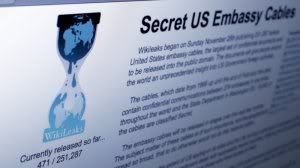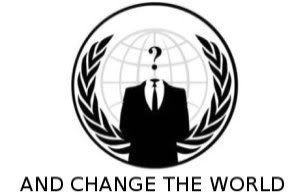Wired published the first chat logs on June 10, 2010. In the article, they indicate that these represent roughly 25% of the logs they received from Adrian Lamo of his chats with Bradley Manning. Later, Wired’s Kevin Poulsen told Glenn Greenwald of Salon that the logs were complete with the exception of “Manning discussing personal matters that aren’t clearly related to his arrest, or apparently sensitive government information that I’m not throwing up without vetting first.”
Lamo also provided Ellen Nakashima of the Washington Post with a complete version of the logs, which were also excerpted on June 10. And on June 19, BoingBoing published what was purported to be a more complete version of one section of the log. The three versions have been merged in the text below:
* Black text – Wired version
* Red text – Washington Post version
* Brown text – BoingBoing version
* Bold — sections BoingBoing believes to have been edited
* Orange text — Both Washington Post and BoingBoing
* Blue text – Both BoingBoing and Wired
* Pink text — Both Washington Post and Wired
* Green text — Washington Post, Wired & BoingBoing versions
May 21
(1:41:12 PM) Bradley Manning: hi
(1:44:04 PM) Manning: how are you?
(1:47:01 PM) Manning:
im an army intelligence analyst, deployed to eastern baghdad, pending discharge for “adjustment disorder” [. . .]
(1:56:24 PM) Manning: im sure you’re pretty busy…
(1:58:31 PM) Manning:
if you had unprecedented access to classified networks 14 hours a day 7 days a week for 8+ months, what would you do?
(1:58:31 PM) Adrian Lamo [AUTO-REPLY]: Tired of being tired
(2:17:29 PM) Manning: ?
(6:07:29 PM) Lamo: What’s your MOS?
(3:16:24 AM) Manning: re: “What’s your MOS?” — Intelligence Analyst (35F)
May 22
(12:15:11 PM) bradass87: hypothetical question: if you had free reign over classified networks for long periods of time… say, 8-9 months… and you saw incredible things, awful things… things that belonged in the public domain, and not on some server stored in a dark room in Washington DC… what would you do?
(12:16:38 PM) bradass87: or Guantanamo, Bagram, Bucca, Taji, VBC for that matter…
(12:17:47 PM) bradass87: things that would have an impact on 6.7 billion people
(12:21:24 PM) bradass87: say… a database of half a million events during the iraq war… from 2004 to 2009… with reports, date time groups, lat-lon locations, casualty figures… ? or 260,000 state department cables from embassies and consulates all over the world, explaining how the first world exploits the third, in detail, from an internal perspective?
(12:22:49 PM) bradass87: the air-gap has been penetrated… =L
(12:23:19 PM) Adrian: how so?
(12:26:09 PM) Adrian: yt?
(12:26:09 PM) bradass87: lets just say *someone* i know intimately well, has been penetrating US classified networks, mining data like the ones described… and been transferring that data from the classified networks over the “air gap” onto a commercial network computer… sorting the data, compressing it, encrypting it, and uploading it to a crazy white haired aussie who can’t seem to stay in one country very long =L
(12:27:13 PM) bradass87: im here
(12:27:24 PM) Adrian: Depends. What are the particulars?
(12:28:19 PM) bradass87: theres substantial lag i think
(12:29:52 PM) Adrian: I don’t understand.
(12:30:13 PM) bradass87: what was the last message you recieved?
(12:30:47 PM) Adrian:
(12:28:19 PM) bradass87: theres substantial lag i think
(12:30:56 PM) bradass87: before that
(12:31:09 PM) Adrian:
(12:26:09 PM) bradass87: lets just say *someone* i know intimately well, has been penetrating US classified networks, mining data like the ones described… and been transferring that data from the classified networks over the “air gap” onto a commercial network computer… sorting the data, compressing it, encrypting it, and uploading it to a crazy white haired aussie who can’t seem to stay in one country very long =L
(12:27:13 PM) bradass87: im here
(12:27:24 PM) Adrian: Depends. What are the particulars?
(12:31:43 PM) bradass87: crazy white haired dude = Julian Assange
(12:33:05 PM) bradass87: in other words… ive made a huge mess :’
(12:35:17 PM) bradass87: im sorry… im just emotionally fractured
(12:39:12 PM) bradass87: im a total mess
(12:41:54 PM) bradass87: i think im in more potential heat than you ever were
(12:41:54 PM) Adrian : I have more messages than resources allocatable to action them. Please be very patient.
(12:45:59 PM) Adrian: not mandatorily
(12:46:08 PM) Adrian: there are always outs
(12:46:17 PM) Adrian: how long have you helped WIkileaks?
(12:49:09 PM) bradass87: since they released the 9/11 “pager messages”
(12:49:38 PM) bradass87: i immediately recognized that they were from an NSA database, and i felt comfortable enough to come forward
(12:50:20 PM) bradass87: so… right after thanksgiving timeframe of 2009
(12:52:33 PM) bradass87: Hilary Clinton, and several thousand diplomats around the world are going to have a heart attack when they wake up one morning, and finds an entire repository of classified foreign policy is available, in searchable format to the public… =L
(12:53:41 PM) bradass87: s/Hilary/Hillary
(12:54:47 PM) Adrian: What sort of content?
(12:56:36 PM) Adrian: brb cigarette
(12:56:43 PM) Adrian: keep typing <3
(12:59:41 PM) bradass87: uhm… crazy, almost criminal political backdealings… the non-PR-versions of world events and crises… uhm… all kinds of stuff like everything from the buildup to the Iraq War during Powell, to what the actual content of “aid packages” is: for instance, PR that the US is sending aid to pakistan includes funding for water/food/clothing… that much is true, it includes that, but the other 85% of it is for F-16 fighters and munitions to aid in the Afghanistan effort, so the US can call in Pakistanis to do aerial bombing instead of americans potentially killing civilians and creating a PR crisis
(1:00:57 PM) bradass87: theres so much… it affects everybody on earth… everywhere there’s a US post… there’s a diplomatic scandal that will be revealed… Iceland, the Vatican, Spain, Brazil, Madascar, if its a country, and its recognized by the US as a country, its got dirt on it
(1:01:27 PM) bradass87: i need one myself
(1:10:38 PM) bradass87: its open diplomacy… world-wide anarchy in CSV format… its Climategate with a global scope, and breathtaking depth… its beautiful, and horrifying…
(1:10:38 PM) Adrian : I have more messages than resources allocatable to action them. Please be very patient.
(1:11:54 PM) bradass87: and… its important that it gets out… i feel, for some bizarre reason
(1:12:02 PM) bradass87: it might actually change something
(1:13:10 PM) bradass87: i just… dont wish to be a part of it… at least not now… im not ready… i wouldn’t mind going to prison for the rest of my life, or being executed so much, if it wasn’t for the possibility of having pictures of me… plastered all over the world press… [...]
(1:14:11 PM) bradass87: i’ve totally lost my mind… i make no sense… the CPU is not made for this motherboard…
(1:30:32 PM) bradass87: >sigh<
(1:31:40 PM) bradass87: i just wanted enough time to figure myself out… to be myself… and be running around all the time, trying to meet someone else’s expectations
(1:32:01 PM) bradass87: *and not be
(1:33:03 PM) bradass87: im just kind of drifting now…
(1:34:11 PM) bradass87: waiting to redeploy to the US, be discharged… [...]
(1:34:45 PM) bradass87: all while witnessing the world freak out as its most intimate secrets are revealed
(1:35:06 PM) bradass87: its such an awkward place to be in, emotionally and psychologically
(1:35:06 PM) Adrian : I have more messages than resources allocatable to action them. Please be very patient.
(1:39:03 PM) Manning: i cant believe what im confessing to you :’(
(1:40:20 PM) Manning: ive been so isolated so long… i just wanted to be nice, and live a normal life… but events kept forcing me to figure out ways to survive… smart enough to know whats going on, but helpless to do anything… no-one took any notice of me
(1:40:43 PM) Manning: :’(
(1:43:51 PM) Lamo: back
(1:43:59 PM) Manning: im self medicating like crazy when im not toiling in the supply office (my new location, since im being discharged, im not offically intel anymore)
(1:44:11 PM) Manning: you missed a lot…
(1:45:00 PM) Lamo: what kind of scandal?
(1:45:16 PM) Manning: hundreds of them
(1:45:40 PM) Lamo: like what? I’m genuinely curious about details.
(1:46:01 PM) Manning: i dont know… theres so many… i dont have the original material anymore
(1:46:18 PM) Manning: uhmm… the Holy See and its position on the Vatican sex scandals
(1:46:26 PM) Lamo: play it by ear
(1:46:29 PM) Manning: the broiling one in Germany
(1:47:36 PM) Manning: im sorry, there’s so many… its impossible for any one human to read all quarter-million… and not feel overwhelmed… and possibly desensitized
(1:48:20 PM) Manning: the scope is so broad… and yet the depth so rich
(1:48:50 PM) Lamo: give me some bona fides … yanno? any specifics.
(1:49:40 PM) Manning: this one was a test: Classified cable from US Embassy Reykjavik on Icesave dated 13 Jan 2010
(1:50:30 PM) Manning: the result of that one was that the icelandic ambassador to the US was recalled, and fired
(1:51:02 PM) Manning: thats just one cable…
(1:51:14 PM) Lamo: Anything unreleased?
(1:51:25 PM) Manning: i’d have to ask assange
(1:51:53 PM) Manning: i zerofilled the original
(1:51:54 PM) Lamo: why do you answer to him?
(1:52:29 PM) Manning: i dont… i just want the material out there… i dont want to be a part of it
(1:52:54 PM) Adrian: i’ve been considering helping wikileaks with opsec
(1:53:13 PM) bradass87: they have decent opsec… im obviously violating it
(1:53:34 PM) bradass87: im a wreck
(1:53:47 PM) bradass87: im a total fucking wreck right now
______________________________
(2:04:29 PM) Manning: im a source, not quite a volunteer
(2:05:38 PM) Manning: i mean, im a high profile source… and i’ve developed a relationship with assange… but i dont know much more than what he tells me, which is very little
(2:05:58 PM) Manning: it took me four months to confirm that the person i was communicating was in fact assange
(2:10:01 PM) Lamo: how’d you do that?
(2:12:45 PM) Manning: I gathered more info when i questioned him whenever he was being tailed in Sweden by State Department officials… i was trying to figure out who was following him… and why… and he was telling me stories of other times he’s been followed… and they matched up with the ones he’s said publicly
(2:14:28 PM) Lamo: did that bear out? the surveillance?
(2:14:46 PM) Manning: based on the description he gave me, I assessed it was the Northern Europe Diplomatic Security Team… trying to figure out how he got the Reykjavik cable…
(2:15:57 PM) Manning: they also caught wind that he had a video… of the Gharani airstrike in afghanistan, which he has, but
hasn’t decrypted yet… the production team was actually working on the Baghdad strike though, which was never really encrypted
(2:16:22 PM) Manning: he’s got the whole 15-6 for that incident… so it wont just be video with no context
(2:16:55 PM) Manning: but its
not nearly as damning… it was an awful incident, but nothing like the baghdad one
(2:17:59 PM) Manning: the investigating officers left the material unprotected, sitting in a directory on a centcom.smil.mil
(2:18:03 PM) Manning: server
(2:18:56 PM) Manning: but they did zip up the files, aes-256, with an excellent password… so afaik it hasn’t been broken yet
(2:19:12 PM) Manning: 14+ chars…
(2:19:37 PM) Manning: i can’t believe what im telling you =L
May 23
(7:19:12 AM) Lamo: hey you
(7:19:19 AM) Lamo: resend?
(7:19:19 AM) Manning: whats up?
(7:19:29 AM) Manning: i just said hello
(7:19:46 AM) Lamo: waking up. got up about an hour ago, 0615.
(7:20:10 AM) Manning: heh, the evening is still young here
(7:20:26 AM) Lamo: how’re you feeling today?
(7:20:37 AM) Manning: im feeling a little better…
(7:20:52 AM) Manning: i had a lot on my mind, keeping to myself
(7:22:18 AM) Lamo: anything new & exciting?
(7:24:21 AM) Manning: no, was outside in the sun all day… 110 degrees F, doing various details for a visiting band and some college team’s cheerleaders…
(7:24:43 AM) Lamo: cheerleaders.
(7:24:46 AM) Manning: ran a barbecue… but no-one showed up… threw a lot of food away
(7:25:20 AM) Manning: yes, football cheerleaders… visiting on off season… apart of Morale Welfare and Recreation (MWR) projects
(7:25:39 AM) Lamo: *sigh*
(7:26:01 AM) Manning: >shrug<
(7:26:37 AM) Manning: im sunburned… and smell like charcoal, sweat, and sunscreen… thats about all thats new
(7:26:47 AM) Lamo: Is there a Baghdad 2600 meeting? ;>
(7:28:04 AM) Manning: there’s only one other person im aware of that actually knows anything about computer security… he’s a SIGINT analyst, of course
(7:28:41 AM) Lamo: Is he the other one who pokes around t he network?
(7:29:26 AM) Manning: no… afaik, he doesn’t play around with classified networks… but im sure he’s capable
(7:30:09 AM) Lamo: then it stands to reason that you have at least 3 people who have some infosec knowledge
(7:31:15 AM) Manning: im not quite sure what you’re saying
(7:31:23 AM) Manning: infosec knowledge of what?
(7:31:29 AM) Manning: the networks?
(7:32:13 AM) Manning: i know a lot of computer security people
(7:32:44 AM) Lamo: i mean, in a way that would lend itself to a meeting.
(7:33:33 AM) Lamo: i’m writing a message trying to tie meetings together globally with a sampling of only ~3000 people to work with and get to go out and evangelize, so i have it on the brain
(7:33:50 AM) Manning: not really… different types of people… know how to, but dont
(7:34:33 AM) Manning: you don’t want these people having a meeting
(7:34:48 AM) Manning: though… i guess you do
______________________________
(8:01:30 AM) Lamo: Does Assange use AIM or other messaging services? I’d like to chat with him one of these days about opsec. My only credentials beyond intrusion are that the FBI never got my data or found me, before my negotiated surrender, but that’s something.
(8:01:53 AM) Lamo: And my data was never recovered.
(8:02:07 AM) Manning: no he does not use AIM
(8:02:37 AM) Lamo: How would I get ahold of him?
(8:02:59 AM) Manning: he would come to you
(8:03:26 AM) Lamo: I’ve never failed to get ahold of someone.
(8:03:29 AM) Manning: he does use OTR though… but discusses nothing OPSEC
(8:03:42 AM) Lamo: I cornered Ashcroft IRL, in the end.
(8:04:19 AM) Manning: he *might* use the ccc.de jabber server… but you didn’t hear that from me
(8:04:33 AM) Lamo: gotcha
(8:06:00 AM) Manning: im going to grab some dinner, ttyl
(8:06:18 AM) Lamo: http://www.facebook.com/photo.php?pid=31130826&id=704990
(8:06:47 AM) Lamo: i didn’t pass security, either. or rather, i did ;>
(8:06:52 AM) Lamo: enjoy dinner.
(8:06:55 AM) Lamo: twys.
(9:12:38 AM) Manning: bk
(9:22:54 AM) Manning: interesting… marine uniform… illegal, but certainly easy
(9:24:11 AM) Manning: why ashcroft?
(9:24:24 AM) Manning: oh, nevermind… DoJ
(9:24:29 AM) Manning: >yawn<
(9:26:52 AM) Manning: im really not familiar at all with FBI stuff
(9:27:04 AM) Manning: americans have so many more rights than non-americans
(9:31:42 AM) Manning: its awful
(9:46:11 AM) Lamo: Ashcroft´s DOJ tried to use the USA PATRIOT Act on me.
(10:06:24 AM) Lamo: around?
(10:12:34 AM) Manning: yeah
(10:12:57 AM) Lamo: are you baptist by any chance?
(10:13:34 AM) Manning: raised catholic… never believed a word of it
(10:13:59 AM) Manning: im godless… i guess i follow humanist values though
(10:14:15 AM) Manning: have custom dogtags that say “Humanist” [...]
(10:17:56 AM) Manning: i was the only non-religous person in town
(10:18:17 AM) Manning: more pews than people…
(10:18:37 AM) Manning: i understand them though
(10:18:53 AM) Manning: im not mean to them… they *really* don’t know
(10:19:39 AM) Manning: i politely disagree… but they are the ones who get uncomfortable when i make, very politely, good leading points…
(10:20:48 AM) Manning: (by leading points, i mean ask multiple questions, with obvious answers, then ask a question based on the answers from the previous questions that challenges their normal response to the same question) (10:21:26 AM) Manning: [excellent example of this: http://www.youtube.com/watch?v=2yhN1IDLQjo] (10:28:21 AM) Manning: new yorker is running 10k word article on wl.org on 30 may, btw
(10:33:07 AM) Lamo: one moment fone
(10:33:30 AM) Manning: (tracking device)
(10:37:28 AM) Manning: trust level increasing? [quantify]
May 25
(02:03:10 AM) Manning: amazing how the world works
(02:03:27 AM) Manning: takes 6 degrees of separation to a whole new level
(02:04:12 AM) Lamo: hey, vacaville
(02:04:18 AM) Lamo: er
(02:04:23 AM) Lamo: vacaville
(02:05:12 AM) Manning: its almost bookworthy in itself, how this played
(02:07:41 AM) Manning: event occurs in 2007, i watch video in 2009 with no context, do research, forward information to group of FOI activists, more research occurs, video is released in 2010, those involved come forward to discuss event, i witness those involved coming forward to discuss publicly, even add them as friends on FB… without them knowing who i am
(02:08:37 AM) Manning:they touch my life, i touch their life, they touch my life again… full circle
(02:08:58 AM) Lamo: Life’s funny.
(02:09:24 AM) Lamo: *random* are you concerned aboutCI/CID looking into your Wiki stuff? I was always paranoid.
(02:09:40 AM) Manning: CID has no open investigation
(02:10:28 AM) Manning: State Department will be uber-pissed… but I dont think they’re capable of tracing everything…
(02:10:44 AM) Lamo: what about CI?
(02:10:51 AM) Manning: might be a congressional investigation, and a joint effort to figure out what happened
(02:11:23 AM) Manning: CI probably took note, but it had no effect on operations
(02:11:48 AM) Manning: so, it was publicly damaging, but didn’t increase attacks or rhetoric…
(02:12:10 AM) Lamo: *nod*
(02:12:34 AM) Manning: re: joint effort will be purely political,”fact finding”… “how can we stop this from happening again”
(02:12:46 AM) Manning: regarding State Dept. cables
(02:13:12 AM) Lamo: Would the cables come from State?
(02:13:21 AM) Manning: yes
(02:13:25 AM) Manning: State Department
(02:13:29 AM) Lamo: I was always a commercial intruder.
(02:13:51 AM) Lamo: Why does your job afford you access?
(02:13:59 AM) Lamo: except for the UN.
(02:14:03 AM) Manning: because i have a workstation
(02:14:15 AM) Lamo: and World Bank.
(02:14:17 AM) Manning: *had*
(02:14:36 AM) Lamo: So you have these stored now?
(02:14:54 AM) Manning: i had two computers… one connected to SIPRNET the other to JWICS…
(02:15:07 AM) Manning: no, they’re government laptops
(02:15:18 AM) Manning: they’ve been zerofilled
(02:15:22 AM) Manning: because of the pullout
(02:15:57 AM) Manning: evidence was destroyed… by the system itself
(02:16:10 AM) Lamo: So how would you deploy the cables? If at all.
(02:16:26 AM) Manning: oh no… cables are reports
(02:16:34 AM) Lamo: ah
(02:16:38 AM) Manning: State Department Cable = a Memorandum (
(02:16:48 AM) Lamo: embassy cables?
(02:16:54 AM) Manning: yes
(02:17:00 AM) Manning: 260,000 in all
(02:17:10 AM) Manning: i mentioned this previously
(02:17:14 AM) Lamo: yes
(02:17:31 AM) Lamo: stored locally, or retreiveable?
(02:17:35 AM) Manning: brb latrine =P
(02:17:43 AM) Manning: i dont have a copy anymore
(02:17:59 AM) Lamo: *nod* (02:18:09 AM) Manning: they were stored on a centralized server…
(02:18:34 AM) Lamo: what’s your endgame plan, then?
(02:18:36 AM) Manning: it was vulnerable as fuck
(02:20:57 AM) Manning: well, it was forwarded to WL
(02:21:18 AM) Manning: and god knows what happens now
(02:22:27 AM) Manning: hopefully worldwide discussion, debates, and reforms
(02:23:06 AM) Manning: if not… than we’re doomed
(02:23:18 AM) Manning: as a species
(02:24:13 AM) Manning: i will officially give up on the society we have if nothing happens
(02:24:58 AM) Manning: the reaction to the video gave me immense hope… CNN’s iReport was overwhelmed… Twitter exploded…
(02:25:18 AM) Manning: people who saw, knew there was something wrong
(02:26:10 AM) Manning: Washington Post sat on the video… David Finkel acquired a copy while embedded out here
(02:26:36 AM) Manning: [also reason as to why there's probably no investigation]
(02:28:10 AM) Manning: i want people to see the truth… regardless of who they are… because without information, you cannot make informed decisions as a public
(02:28:10 AM) Lamo : I’m not here right now
(02:28:50 AM) Manning: if i knew then, what i knew now… kind of thing…
(02:29:31 AM) Manning: or maybe im just young, naive, and stupid…
(02:30:09 AM) Lamo: which do you think it is?
(02:30:29 AM) Manning: im hoping for the former
(02:30:53 AM) Manning: it cant be the latter
(02:31:06 AM) Manning: because if it is… were fucking screwed
(02:31:12 AM) Manning: (as a society)
(02:31:49 AM) Manning: and i dont want to believe that we’re screwed
(02:32:53 AM) Manning: food time… ttys
______________________________
(02:26:01 PM) Manning: i dont believe in good guys versus bad guys anymore… i only a plethora of states acting in self interest… with varying ethics and moral standards of course, but self-interest nonetheless
(02:26:18 PM) Manning: s/only/only see/
(02:26:47 PM) Lamo: the tm meant i was being facetious
(02:26:59 PM) Manning: gotchya
(02:27:47 PM) Manning: i mean, we’re better in some respects… we’re much more subtle… use a lot more words and legal techniques to legitimize everything
(02:28:00 PM) Manning: its better than disappearing in the middle of the night
(02:28:19 PM) Manning: but just because something is more subtle, doesn’t make it right
(02:29:04 PM) Manning: i guess im too idealistic
(02:31:02 PM) Manning: i think the thing that got me the most… that made me rethink the world more than anything
(02:35:46 PM) Manning: was watching 15 detainees taken by the Iraqi Federal Police… for printing “anti-Iraqi literature”… the iraqi federal police wouldn’t cooperate with US forces, so i was instructed to investigate the matter, find out who the “bad guys” were, and how significant this was for the FPs… it turned out, they had printed a scholarly critique against PM Maliki… i had an interpreter read it for me… and when i found out that it was a benign political critique titled “Where did the money go?” and following the corruption trail within the PM’s cabinet… i immediately took that information and *ran* to the officer to explain what was going on… he didn’t want to hear any of it… he told me to shut up and explain how we could assist the FPs in finding *MORE* detainees…
(02:35:46 PM) Lamo : I’m not here right now
(02:36:27 PM) Manning: everything started slipping after that… i saw things differently
(02:37:37 PM) Manning: i had always questioned the things worked, and investigated to find the truth… but that was a point where i was a *part* of something… i was actively involved in something that i was completely against…
(02:38:12 PM) Lamo: That could happen in Colombia.
(02:38:21 PM) Lamo: Different cultures, dude.
(02:38:28 PM) Lamo: Life is cheaper.
(02:38:34 PM) Manning: oh im quite aware
(02:38:45 PM) Lamo: What would you do if your role /w Wikileaks seemed in danger of being blown?
(02:38:48 PM) Manning: but i was a part of it… and completely helpless…
(02:39:01 PM) Lamo: sometimes we’re all helpless
(02:39:34 PM) Manning: try and figure out how i could get my side of the story out… before everything was twisted around to make me look like Nidal Hassan
(02:40:15 PM) Manning: i dont think its going to happen
(02:40:26 PM) Manning: i mean, i was never noticed
(02:41:10 PM) Manning: regularly ignored… except when i had something essential… then it was back to “bring me coffee, then sweep the floor”
(02:42:24 PM) Manning: i never quite understood that
(02:42:44 PM) Manning: felt like i was an abused work horse…
(02:43:33 PM) Manning: also, theres god awful accountability of IP addresses…
(02:44:47 PM) Manning: the network was upgraded, and patched up so many times… and systems would go down, logs would be lost… and when moved or upgraded… hard drives were zeroed
(02:45:12 PM) Manning: its impossible to trace much on these field networks…
(02:46:10 PM) Manning: and who would honestly expect so much information to be exfiltrated from a field network?
(02:46:25 PM) Lamo: I’d be one paranoid boy in your shoes.
(02:47:07 PM) Manning: the CM video came from a server in our domain! and not a single person noticed
(02:47:21 PM) Lamo: CM?
(02:48:17 PM) Manning: Apache Weapons Team video of 12 JUL 07 airstrike on Reuters Journos… some sketchy but fairly normal street-folk… and civilians
(02:48:52 PM) Lamo: How long between the leak and the publication?
(02:49:18 PM) Manning: some time in february
(02:49:25 PM) Manning: it was uploaded
(02:50:04 PM) Lamo: uploaded where? how would i transmit something if i had similarly damning data
(02:51:49 PM) Manning: uhm… preferably openssl the file with aes-256… then use sftp at prearranged drop ip addresses
(02:52:08 PM) Manning: keeping the key separate… and uploading via a different means
(02:52:31 PM) Lamo: so i myself would be SOL w/o a way to prearrange
(02:54:33 PM) Manning: not necessarily… the HTTPS submission should suffice legally… though i’d use tor on top of it…
(02:54:43 PM) Manning: but you’re data is going to be watched
(02:54:44 PM) Manning: *your
(02:54:49 PM) Manning: by someone, more than likely
(02:54:53 PM) Lamo: submission where?
(02:55:07 PM) Manning: wl.org submission system
(02:55:23 PM) Lamo: in the massive queue?
(02:55:54 PM) Manning: lol, yeah, it IS pretty massive…
(02:55:56 PM) Manning: buried
(02:56:04 PM) Manning: i see what you mean
(02:56:35 PM) Manning: long term sources do get preference… i can see where the “unfairness” factor comes in
(02:56:53 PM) Lamo: how does that preference work?
(02:57:47 PM) Manning: veracity… the material is easy to verify…
(02:58:27 PM) Manning: because they know a little bit more about the source than a purely anonymous one
(02:59:04 PM) Manning: and confirmation publicly from earlier material, would make them more likely to publish… i guess…
(02:59:16 PM) Manning: im not saying they do… but i can see how that might develop
(03:00:18 PM) Manning: if two of the largest public relations “coups” have come from a single source… for instance
(03:02:03 PM) Manning: you yeah… purely *submitting* material is more likely to get overlooked without contacting them by other means and saying hey, check your submissions for x… Manning described the first time he watched the Iraq video, after finding it in a network directory where an Army JAG officer left it. He speculated that Washington Post writer and book author David Finkel already had a copy of the video when he wrote his book The Good Soldiers, published last year.
(03:07:26 PM) Manning: i recognized the value of some things…
______________________________
(03:07:33 PM) Manning: knew what they meant… dug deeper
(03:07:53 PM) Manning: i watched that video cold, for instance
(03:10:32 PM) Manning: at first glance… it was just a bunch of guys getting shot up by a helicopter… no big deal… about two dozen more where that came from right… but something struck me as odd with the van thing… and also the fact it was being stored in a JAG officer’s directory… so i looked into it… eventually tracked down the date, and then the exact GPS co-ord… and i was like… ok, so thats what happened… cool… then i went to the regular internet… and it was still on my mind… so i typed into goog… the date, and the location… and then i see this http://www.nytimes.com/2007/07/13/world/middleeast/13iraq.html
(03:11:07 PM) Manning: i kept that in my mind for weeks… probably a month and a half… before i forwarded it to [Wikileaks]
(03:11:54 PM) Manning: then there was the Finkel book
(03:12:16 PM) Manning: im almost certain he had a copy Manning discussed how common and easy it was for soldiers to bring removable media into their work environment, making it easy for him, or anyone else, to siphon data from classified networks without raising suspicion.
Time Lapse
[Wired chat logs drop back one hour with; context suggests these are not from the May 25 sequence]
(01:52:30 PM) Manning: funny thing is… we transffered so much data on unmarked CDs…
(01:52:42 PM) Manning: everyone did… videos… movies… music
(01:53:05 PM) Manning: all out in the open
(01:53:53 PM) Manning: bringing CDs too and from the networks was/is a common phenomeon
(01:54:14 PM) Lamo: is that how you got the cables out?
(01:54:28 PM) Manning: perhaps
(01:54:42 PM) Manning: i would come in with music on a CD-RW
(01:55:21 PM) Manning: labelled with something like “Lady Gaga”… erase the music… then write a compressed split file
(01:55:46 PM) Manning: no-one suspected a thing
(01:55:48 PM) Manning: =L kind of sad
(01:56:04 PM) Lamo: and odds are, they never will
(01:56:07 PM) Manning: i didnt even have to hide anything
(01:56:36 PM) Lamo: from a professional perspective, i’m curious how the server they were on was insecure
(01:57:19 PM) Manning: you had people working 14 hours a day… every single day… no weekends… no recreation…
(01:57:27 PM) Manning: people stopped caring after 3 weeks
(01:57:44 PM) Lamo: i mean, technically speaking
(01:57:51 PM) Lamo: or was it physical
(01:57:52 PM) Manning: >nod<
(01:58:16 PM) Manning: there was no physical security
(01:58:18 PM) Lamo: it was physical access, wasn’t it
(01:58:20 PM) Lamo: hah
(01:58:33 PM) Manning: it was there, but not really
(01:58:51 PM) Manning: 5 digit cipher lock… but you could knock and the door…
(01:58:55 PM) Manning: *on
(01:59:15 PM) Manning: weapons, but everyone has weapons
(02:00:12 PM) Manning: everyone just sat at their workstations… watching music videos / car chases / buildings exploding… and writing more stuff to CD/DVD… the culture fed opportunities
(02:01:44 PM) Manning: hardest part is arguably internet access… uploading any sensitive data over the open internet is a bad idea… since networks are monitored for any insurgent/terrorist/militia/criminal types
(02:01:52 PM) Lamo: tor?
(02:02:13 PM) Manning: tor + ssl + sftp
(02:02:33 PM) Lamo: *nod*
(02:03:05 PM) Lamo: not quite how i might do it, but good
(02:03:22 PM) Manning: i even asked the NSA guy if he could find any suspicious activity coming out of local networks… he shrugged and said… “its not a priority”
(02:03:53 PM) Manning: went back to watching “Eagle’s Eye”
______________________________
(02:12:23 PM) Manning: so… it was a massive data spillage… facilitated by numerous factors… both physically, technically, and culturally
(02:13:02 PM) Manning:: perfect example of how not to do INFOSEC
(02:14:21 PM) Manning: listened and lip-synced to Lady Gaga’s Telephone while exfiltratrating possibly the largest data spillage in american history
(02:15:03 PM) Manning: pretty simple, and unglamorous
(02:16:37 PM) Manning: *exfiltrating
(02:17:56 PM) Manning: weak servers, weak logging, weak physical security, weak counter-intelligence, inattentive signal analysis… a perfect storm
(02:19:03 PM) Manning: >sigh<
(02:19:19 PM) Manning: sounds pretty bad huh?
(02:20:06 PM) Lamo: kinda :x
(02:20:25 PM) Manning: :L
(02:20:52 PM) Lamo: i mean, for the .mil
(02:21:08 PM) Manning: well, it SHOULD be better
(02:21:32 PM) Manning: its sad
(02:22:47 PM) Manning: i mean what if i were someone more malicious
(02:23:25 PM) Manning: i could’ve sold to russia or china, and made bank?
(02:23:36 PM) Lamo: why didn’t you?
(02:23:58 PM) Manning: because it’s public data
(02:24:15 PM) Lamo: i mean, the cables
(02:24:46 PM) Manning: it belongs in the public domain
(02:25:15 PM) Manning: information should be free
(02:25:39 PM) Manning: it belongs in the public domain
(02:26:18 PM) Manning: because another state would just take advantage of the information… try and get some edge
(02:26:55 PM) Manning: if its out in the open… it should be a public good
(02:27:04 PM) Manning: *do the
(02:27:23 PM) Manning: rather than some slimy intel collector
(02:29:18 PM) Manning: im crazy like that
______________________________
(03:38:07 PM) Manning: its not much of a pic, but here’s harry ponting http://farm4.static.flickr.com/3161/2814062024_c39d25f27d.jpg the man who’s mission it is to sell the benefits of NCD throughout the State Department, Military, and IC
(03:38:18 PM) Manning: i feel terribly, terribly sorry for the guy :(
(03:39:17 PM) Manning: im not a bad person, i keep track of everything
(03:39:30 PM) Manning: i watch the whole thing unfold… from a distance
(03:40:07 PM) Manning: i read what everyone says… look at pictures… keep tabs… and feel for them
(03:40:18 PM) Manning: since im basically playing a vital role in their life
(03:40:29 PM) Manning: without ever meeting them
(03:40:53 PM) Manning: i was like that as an intelligence analyst as well
(03:41:09 PM) Lamo: i know the feeling, in a way.
(03:41:44 PM) Manning: most didnt care… but i knew, i was playing a role in the lives of hundreds of people, without them knowing them… but i cared, and kept track of some of the details, make sure everybody was okay
(03:42:07 PM) Manning: them knowing me
(03:43:27 PM) Manning: i dont think of myself as playing “god” or anything, because im not… im just playing my role for the moment… i dont control the way they react
(03:44:15 PM) Manning: there are far more people who do what i do, in state interest, on daily basis, and dont give a fuck
(03:45:01 PM) Manning: thats how i try to separate myself
(03:45:13 PM) Manning: from my (former) colleagues Lamo asked what additional material Manning gave to Julian Assange at Wikileaks.
______________________________
(04:32:05 PM) Manning: oh, the JTF GTMO papers… Assange has those too
(04:32:16 PM) Lamo: Read it.
(04:33:21 PM) Lamo: Anything else interesting on his table, as a former collector of interesting .com info?
(04:33:44 PM) Manning: idk… i only know what i provide him xD
(04:34:14 PM) Lamo: what do you consider the highlights?
(04:35:31 PM) Manning: The Gharani airstrike videos and full report, Iraq war event log, the “Gitmo Papers”, and State Department cable database
(04:35:50 PM) Lamo: Not too shabby.
(04:36:03 PM) Manning: thats just me….
(04:36:26 PM) Manning: idk about the rest… he *hopefully* has more
______________________________
(04:42:16 PM) Manning: im not sure whether i’d be considered a type of “hacker”, “cracker”, “hacktivist”, “leaker” or what…
(04:42:26 PM) Manning: im just me… really
(04:44:21 PM) Manning: starts off like every physics / astro class intro… ever
(04:44:21 PM) Lamo : I’m not here right now
(04:44:45 PM) Manning: albeit without the algebraic proofs
(04:45:20 PM) Lamo: or a spy :)
(04:45:48 PM) Manning: i couldn’t be a spy…
(04:45:59 PM) Manning: spies dont post things up for the world to see
(04:46:14 PM) Lamo: Why? Wikileaks would be the perfect cover
(04:46:23 PM) Lamo: They post what’s not useful
(04:46:29 PM) Lamo: And keep the rest
______________________________
Wired,
6/10/2010: “[Manning] said that Julian Assange had offered him a position at Wikileaks. But he said, ‘I’m not interested right now. Too much excess baggage.’”
Manning: my family is non-supportive . . . im losing my job . . . losing my career options . . . i dont have much more except for this laptop, some books, and a hell of a story.
Manning: i’m exhausted . . . in desperation to get somewhere in life . . . i joined the army . . . and that’s proven to be a disaster now . . . and now i’m quite possibly on the verge of being the most notorious ‘hacktivist’ or whatever you want to call it . . . its all a big mess i’ve created.
“[Manning] confided in Lamo that he was homeless in 2006 and had drifted from Tulsa to Chicago before landing at his aunt’s house in Potomac.”
Claims made about other things contained in the chat logs, not included in the releases:
Wired, 6/6/2010: “Manning told Lamo that he enlisted in the Army in 2007 and held a Top Secret/SCI clearance, details confirmed by his friends and family members.”
CBC Radio, 6/7/2010: LAMO: “[Manning] also also mentioned to me a top secret operation that the Army for lack of a better word freaked out over when I mentioned it to them. They would not even say it out loud, they wrote it on paper and showed it to somebody else when discussing it….It was when I initially confirmed through a friend of mine who had experience in military counterintelligence and had him virtually blanche — or at least I imagined over the telephone — when I mentioned the operation, that I knew that I had to act.”
New York Times, 6/7/2010: “[Lamo] said that Army investigators were particularly concerned about one sensitive piece of information that Specialist Manning possessed that Mr. Lamo would not discuss in more detail.”
Washingtonian, 6/8/2010: “Lamo declines to elaborate on the nature of any condition or the circumstances behind Manning’s discharge but says that Manning described them …When
The Washingtonian asked whether Manning was being discharged under “don’t ask, don’t tell,” Lamo said, “It’s not my place to speak on Mr. Manning’s behalf. In general terms, he was not a supporter of the [DADT] policy, as a number of soldiers are, both straight and gay.” Lamo says that Manning expressed his views on the military’s policy “at least in passing once or twice”… Lamo says that Manning never showed him the cables but that after he mentioned a specific military operation by name, Lamo was afraid he could become implicated in Manning’s alleged leak.”
Wired, 6/10/2010: “He said that Julian Assange had offered him a position at Wikileaks. But he said, ‘I’m not interested right now. Too much excess baggage.’”
Risky Business, 6/10/2010: LAMO: “There were issues other than the cables that I can’t get into that were very specific and did have significant ramifications in terms of our safety, both economic and national.”
CNET, 6/12/2010: “Manning told Lamo that he leaked the code name and details of a government investigation being conducted regarding the attacks on Google, Lamo said.”
AOL, 7/21/2010: “Their [Army counterintelligence's] immediate response when I related the code name for one of the operations was ‘Never say those words again,’ ” Lamo told me. “Literally, ‘Forget you ever heard those words.’ And when I met with two federal agents to discuss them, they had me write it down on a piece of paper rather than say it aloud.”
CNN.com, 7/29/2010: “As far as I know, he conducted the database himself but got technical assistance from another source,” Lamo said. “[Manning] was aware of one other person in military engaged in accessing databases without authorization.”
CNN.com, 7/30/2010: “[Lamo] also said that the logs contained personal information that he does not want exposed. And that
there’s information that he has that no one has seen, that could compromise National Security.
CNN, 7/30/2010: “I expressed to him that it could be very well considered espionage. And he respectfully disagreed….Bradley Manning did leak to me information related to ongoing classified counter intelligence operations, which based on my interaction with the United States’ Army and defense authorities, were considered highly sensitive….[Manning] had approached the local national security agency operative at Forward Operating Base Hammer, where he was stationed, and inquired of them whether or not they had detected any suspicious traffic. And the answer to that was, no, at which point they went back to watching a movie.”
Boston Globe, 8/1/2010: “Adrian Lamo, a former computer hacker who traded instant messages with Manning and later turned him in to authorities, said he knew of five people whom Army officials have interviewed over the past few months in the Boston area…Lamo said he doubts Manning had the technical savvy to copy all the data on his own. He thinks Manning received help from hackers in the area who provided him with encryption software to send the classified information to WikiLeaks, and who helped him ensure those leaks were featured prominently on the website….Lamo said he thinks the group in Boston provided Manning with software that allowed him to download thousands of documents without alerting network monitors at the Defense Department. He added that Manning had one of his associates in Boston physically provide WikiLeaks with documents he downloaded on CDs.”
CNN.com, 8/4/2010: “Lamo confirmed he told Manning the soldier’s online conversations could be protected under the California shield law because it could be seen as a conversation with a journalist. Lamo says he does consider himself a journalist and that he made the offer in good faith.”
BBC News, 8/6/2010: “I was a private citizen in a private capacity – there was no source, journalist relationship,” [Lamo] told BBC News. “I did tell him that I worked as a journalist. I would have been happy to write about him myself, but we just decided that it would be too unethical.”
New York Times, 12/16/2010: “Private Manning is said to claim that he had been directly communicating with Mr. Assange using an encrypted Internet conferencing service as the soldier was downloading government files. Private Manning is also said to have claimed that Mr. Assange gave him access to a dedicated server for uploading some of them to WikiLeaks. Adrian Lamo, an ex-hacker in whom Private Manning confided and who eventually turned him in, said Private Manning detailed those interactions in instant-message conversations with him. He said the special server’s purpose was to allow Private Manning’s submissions to “be bumped to the top of the queue for review.” By Mr. Lamo’s account, Private Manning bragged about this “as evidence of his status as the high-profile source for WikiLeaks….Wired magazine has published
excerpts from logs of online chats between Mr. Lamo and Private Manning. But the sections in which Private Manning is said to detail contacts with Mr. Assange are not among them. Mr. Lamo described them from memory in an interview with The Times, but he said he could not provide the full chat transcript because the F.B.I. had taken his hard drive, on which it was saved.”
Vía firedoglake (FDL)

















